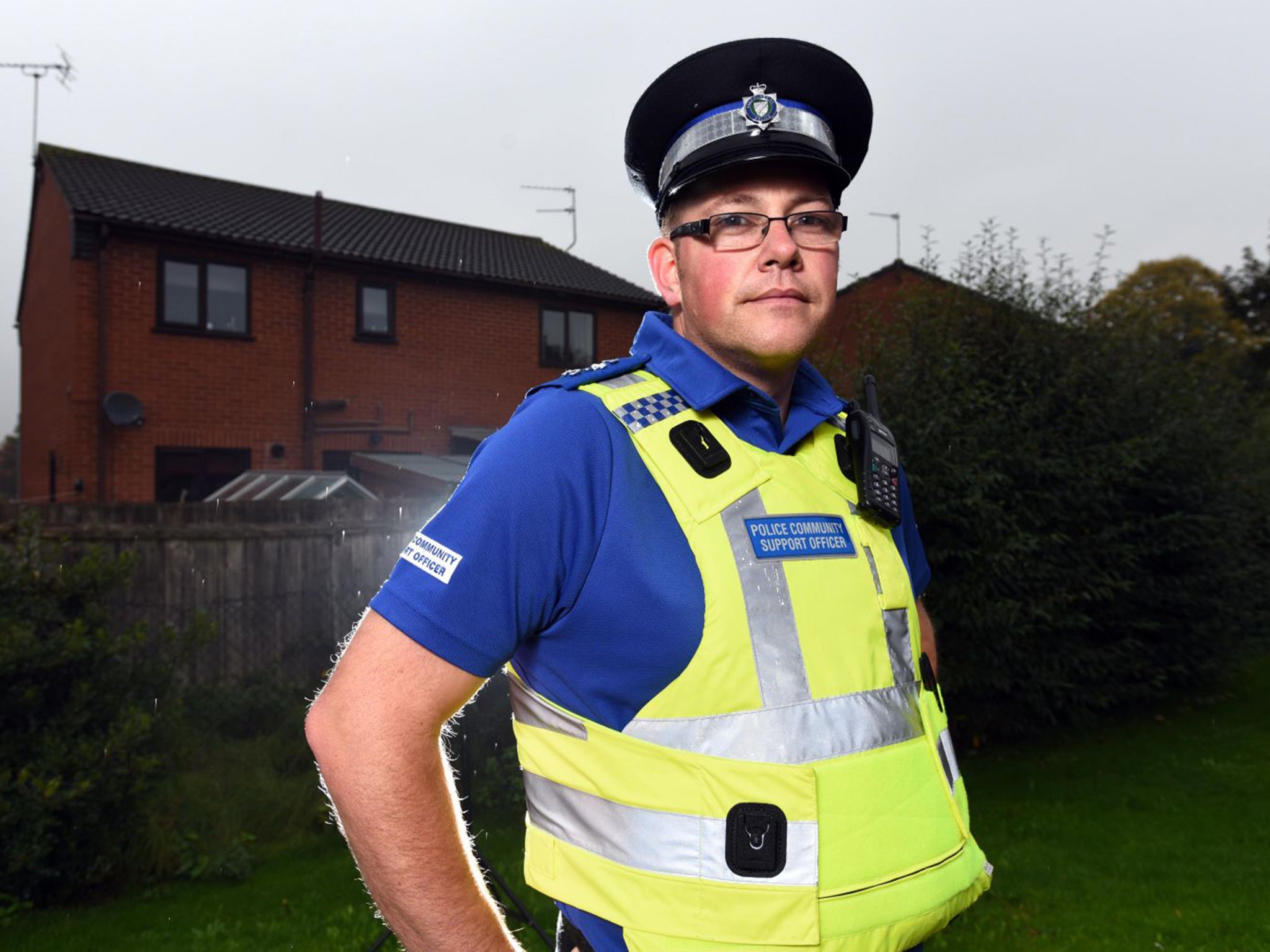Police cuts: PCSOs step in as forces plan for major staffing cuts
In the final part of our series, we look at the volunteer PCSO

Recruited, put in uniform and out on patrol for the paltry cost of a pound an hour, Kevin Burnett is a cut-price option for curbing antisocial behaviour in the quiet Lincolnshire town of Gainsborough.
Instead of sending a police officer to sort out the children messing about on riverside railings, Mr Burnett represents a considerably cheaper option for one of the smallest and most cash-strapped forces in the country.
While he doesn’t receive the same training as his full-time police and community support officer (PCSO) colleagues – or their salary, which can reach £27,000 – the only thing that marks him out as different is the small silver “V” for volunteer on his shoulder.
By sending out Mr Burnett, the force can direct its full-time officers to crimes more worthy of attention. But, as the 37-year-old points out, “if somebody wanted to speak to me, they’d believe I’m a fully paid-up member of the police”.
Mr Burnett is part of a project cited by the Home Secretary, Theresa May, as a blueprint for the future of policing as the service plans for major staffing cuts.
Senior police chiefs have warned that the era of routine police patrols is coming to an end and a rise in volunteer PCSOs – who number about 30 in Lincolnshire – represent, at best, a partial and cheap solution.
“It costs a pound an hour in terms of uniform, training and expenses for each productive hour that they work,” said Lincolnshire’s Chief Constable Neil Rhodes. “But I don’t think it’s possible for volunteers to make the sort of contribution that might be necessary if a force was to face a really major funding challenge.”
The Government announced new plans to “finish the job of police reform” this summer, with measures that include enhancing the role of volunteers, which could give them powers to detain people for 30 minutes and issue penalty notices. A public consultation ends on 31 October.
In announcing the plans, Ms May said: “I believe volunteers can do more, helping forces to create a flexible workforce, bring in new skills, and free up officers’ time to focus on the jobs only they can carry out.”
Jack Dromey, Labour’s shadow policing minister, responded by accusing the Government of damaging the role of the beat bobby. “Officers and PCSOs are extensively trained to deal with high-risk situations, sensitive and confidential information and vulnerable people. May’s announcements show that she totally misunderstands the nature of the roles.”
Lincolnshire’s police and crime commissioner, Alan Hardwick, launched a project aimed at recruiting 1,000 volunteers to exploit the pool of public-spirited people in a market cornered by the National Trust and the heritage industry. It follows a series of other volunteer projects around the country, including “Speedwatch” for which police supply cameras and high-visibility equipment to citizen groups concerned about speeding in their area.
He said that the volunteers, who number about 550, were not an alternative to full-time officers. “None of our volunteers will replace a staff member – that’s a no-no,” said Mr Hardwick. “Policing in Lincolnshire wouldn’t collapse without volunteers, but it would be a whole lot more difficult.”
The role of the volunteer officer has been around since 1831 with the development of the “specials” (aka hobby bobbies) who have the full powers of police officers.
Some 16,000 of them represent about half of the total number of volunteers who join 207,000 paid staff and officers in British policing. The National Crime Agency – set up to deal with serious and organised crime – has sought to recruit specials from industry to deal with the shortfall in skills for cyber and fraud investigations.
“If we’re going to get those skills, we will have to buy them in at extraordinary expense, or appeal to the public-spiritedness of people to make communities safer,” said Rob Beckley, chief operating officer of the College of Policing, who has championed the role of volunteers in the service.
The new volunteers in Lincolnshire will perform the same role as full-time PCSOs, introduced nationwide in 2002 when they were derided as “plastic police” by unions, because they do not have the power to make arrests.
Mr Burnett, a police archivist by day who works for five hours one evening a week, told The Independent during an uneventful 30-minute evening patrol that he may use the experience to launch a full-time policing career. “If by having more uniforms on the street it can improve the town, then that can only be a good thing,” he said.
